UPDATED 03 OCT 2017
Originally Published on: Aug 26, 2000 @ 12:49
This page is to give more insight into the etymology of the names picked by Gen. Choi and others to promote the Chang Hon style of Taekwon-Do. The first set of ‘characters’ are Korean (Hangul), the second set is Chinese (Hanja) and the third set is it’s original seal script (Chinese) dating anywhere between 220 B.C. to about 1600A.D. Some characters do not have the older ‘seal scripts’

Chon-Ji
Chon originally meant “the sky above man” and has morphed into “the sky / the heavens / the vault of heavens / the firmament / Nature / God / Heaven / nature / natural / not artificial / a day / seasons / climates / weather / father or husband / something indispensable / necessities” the word “Ji” organically meant “potters clay or earth” and morphed into “the earth / land / soil / ground / a region / a territory / a belt / a place / a locality / a position / a place / a situation /”
Dan-Gun 단군 / 檀君![]()
![]()

Dan originally meant “sandalwood” basically a family name in Chinese, and Gun meant a man who speaks with a hand and a rod – monarch and morphed into “a sovereign / a monarch / a king / a lord / you (used in addressing a male in formal speech) “

Do-San도산 / 島山
![]()
![]()
Do originally meant “aspect of a mountain – island” and has now morphed into just “an island / an isle” San meant mountains and now is known as a hill or mountain.
Won-Wyo 원효 / 元曉![]()
![]()
Won meant “a man with the head accentuated” and then morphed into “the beginning / the 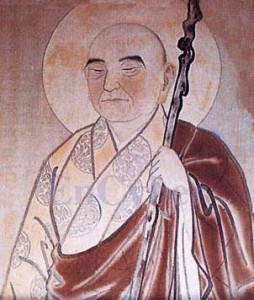 first / original / the head / a dollar / the eldest / chief / big / (Chinese astrology) 60 years / the Yuan Dynasty” And Hyo meant “daybreak / dawn / to tell / to explain / to know / to understand”
first / original / the head / a dollar / the eldest / chief / big / (Chinese astrology) 60 years / the Yuan Dynasty” And Hyo meant “daybreak / dawn / to tell / to explain / to know / to understand”
Yul-Gok 율곡 (叔獻)![]()
![]()

Yul meant “a kind of tree ? with fruit (primitive) ? at top and morphed into “a chestnut tree / strong and tough / firm / durable / respectful / fearful / awe-inspiring / to tremble / dignified / majestic / a Chinese family name” Gok meant “Water flowing forth ?? from an opening ?” and morphed into “a valley / a waterway between two mountains / a ravine / a hollow / a pit / a dilemma / a difficult situation / a predicament / a Chinese family name”
Joong-Gun 중근 (重根)![]()
![]()

Joong meant “man ? holding heavy bag ? full of dirt ? – heavy” and now means “heavy / weighty / much / to weigh / weight / difficult / serious / grave / severe / important / significant / to value / to emphasize” and Gun meant “part of a tree ? – root” and not today means “he root of a plant / a base / a foundation / the beginning, cause, or source of something / ( mathematics ) the root of a number / ( chemistry ) radical / a piece ( of string, rope, etc. ) / a (stick, spear or thing of slender shape) / a Chinese family name”
Toi-Gye 퇴계 (退溪) 

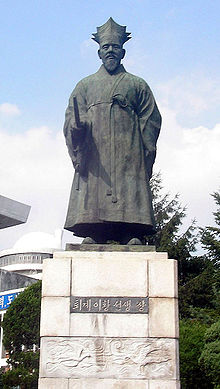
Toi meant “n the road ??(??) to walk away ? from the sun ? – retreat (not ?)” and now has come to mean “to retreat / to withdraw / to recede / to regress / to retrogress / to recoil / to shrink / to bow out / to retire / to send back / to give back / to return” and Gye meant “of water ?? – mountain stream” and now “a mountain stream.”
Hwa-Rang 화랑 (花郞) ![]()

Hwa meant “a type of plant ?? – flower” and now has come to mean “a flower / a blossom / a flowering plant / a prostitute / prostitution / as in??-smallpox / varicolored / fireworks / to spend / to expend” and Rang means “an official rank in ancient times / a man / the husband / the beau / the master ( as opposite to servants ) / a Chinese family name”
Choong-Moo 충무 (忠武)
![]()
![]()
Choong meant “related to the heart ?? – loyalty” and now means “faithful / loyal / sincere / patriotic / constant / loyalty / sincerity / devoted / honest ( advice, etc. )” Moo meant “to walk ? with a weapon ? – military” and now means “force / military / warlike / martial / footprints / steps / the length of half a pace / the string of an ancient hat / to inherit / a Chinese family name”
Kwang-Gae 광개 (廣開 )
![]()
![]()
Kwang meant “aspect of building ? – wide spacious” and now means “wide / broad / spacious / extensive / to stretch / to extend / Kwangtung or Kwangsi” Gae meant “hands ? taking off the bolt ? and (opening) the door ?” and now means “to open / to drive / to begin / to start / to reveal / to disclose / to state / to explain / to found / to expand / to eliminate / to divide into / to write down / to list / to undo / to unfold / to wind off / a carat / to run ( a shop or business )”
Po-Eun 포은 (圃隱) ![]()

Po meant “enclosed garden” and now means “a vegetable garden ( or plot ) / a nursery / an orchard / a plantation / a planter / a gardener” Eun meant “hidden behind a wall ??” and now means “hidden / concealed / secret / mysterious / dark / obscure / not evident or obvious / to retire / to reject public life / to live like a hermit / painful / grievous / a riddle / destitute / poor / to examine and study / a low wall / a Chinese family name”
Gae-Baek 계백(階伯) ![]()
![]()
Gae meant having to do with a wall or slope?? – steps – rank, now meaning a way leading to the main hall / a flight of steps or stairs / a grade or a rank / to rely on / alternate ?.Baek meant type of a person ?? – uncle and now means one’s father’s elder brother / an uncle / a rank of the nobility – a count.
Eui-Am 의암 (義菴) ![]()
Eui meant probably a sacrifice of a sheep ? and products of the field ? – generous, and now means “justice / righteousness / generosity / charity / philanthropy / chivalry / meaning / connotations / unreal / artificial / false / a Chinese family name.”
Juche 주체 (主 體) ![]()


Ju meant “oil lamp made of clay ? which the “leader” holds” and now means “a master / a leader / a chief / a host / Jesus Christ / God / Lord / to officiate at / to preside over / to take charge of / main / chief / primary / principal” and Che meant “related to bones ? – body” and now means “the body / shape / form / an entity / a unit / a style / a fashion / a system / substance / essence / theory (as opposed to practice).”
Ko-Dang 고당 (古堂) ![]()
![]()
Ko meant “the highest ? respect ? – honor” and now means “to honor / to respect / to revere / to adore / to worship / to venerate / to esteem / high / lofty / noble / dignified / exalted / a Chinese family name” and Dang meant “A high building” and now has come to mean “high / tall / of a high level or degree / above the average / lofty / a Chinese family name.”
Sam-Il 삼일 (三一) ![]()
![]()
Sam meant “3 of something” and now means “three / third / thrice” and Il meant “Indicates one object” and now means “one / unit / single / alone / whole / throughout / a, an, the / to unite / once / as soon as / each / per / every time”
Yoo-Sin 유신 (庾信) ![]()
![]()
Yoo meant “aspect of building ? – enclosed place” and now means “an enclosed place for storing grain / a unit of an ancient measure of capacity equivalent to 1 6 deciliters / a Chinese family name” and Sin meant “action of a person ?? – honesty” and generally means “honesty / truthfulness / faith / confidence / trust / believing / true / to believe or trust / an envoy / an emissary / a messenger / news / a message / information / word / a letter / mail / credentials / evidence / a pledge / a token / a sign / to let ( others do what they choose ) / free / easy / aimless / at will / at random / without a plan / regular periodical appearance.”
Choi-Yong 최영 (崔榮 ) ![]()
![]()
Choi meant “the mountain ? only the bird ? can get to – high and steep” and now means “a Chinese family name / high and steep.” Yong meant “flowers (not fire ? or tree ?) – lush” and now generally means “glory / honor / luxuriant / lush / teeming / leafy / a Chinese family name.”
Yong-Gae 연개 (淵蓋) ![]()
![]()
Yong meant “of water ?? – deep” and now “deep waters / a gulf / an abyss / profound (learning) / depth / profundity erudition / extensive / a Chinese family name” and Gae “like ? the grass ?? where you can hide and be covered ?” and now generally means “to cover / to hide / a lid / a covering / to build / to construct / to erect / to affix (a seal) / (an initial particle) now / then / but / because / (a particle indicating doubt) for / perhaps / possibly / about / to surpass / to excel / to brag / to boast.”
Ul-Ji 을지 (乙支) ![]()
![]()
UL meant “2nd Celestial stem – Possibly a sprout” now generally means “the second of the Ten Celestial Stems / one / someone / an ancient Chinese family name.” And Ji meant “Hand ?holding branch” and now to pay / to disburse / to defray / to support / to sustain / to bear / to prop up / to put up / to prick up / to raise / to send away / to put somebody off / a branch / a subdivision / an offshoot / a term for indicating amount or number / ( textile ) count / as in ??, the Terrestrial Branches used in calculation with the Celestial Stems ( ?? ).”
Moon-Moo 문무 (文武 )
![]()
![]()
Moon meant “a tattoo on a chest inside cloths – design – lines – words” and now means “a composition / an article / language / literature / culture / education / elegant / cultured / polished / suave / civil / polite / urbane / mild / civilian or civil ( as opposed to military ) / a former monetary unit / as in ???? ( to own nothing ) / a Chinese family name.” Moo meant “to walk ? with a weapon ? – military” and now means “force / military / warlike / martial / footprints / steps / the length of half a pace / the string of an ancient hat / to inherit / a Chinese family name”
So-San 서산 (西山) ![]()
![]()
So meant“a bag tied at one end – bags of stuff (??)” and now “west / the west / western / Western / the West / European / American / Occidental / foreign / a Chinese family name.”San meant mountains and now is known as a hill or mountain.
Se-Jong 세종 (世宗) ![]()
![]()

Se meant “Probably indicates 30 for 30 years of the average life” and now “a generation / a person’s life span / an age / the world” and Jong “house ? of worship ? – sect” and now “an ancestor / a clan / a sect / a religion / to believe in / a Chinese family name.”
Tong-Il 통일 (統一) ![]()
![]()
Tong “related to string ? or line – bind – unify” and now “control / to unify / to unite / wholly / totally / completely / generally / all / succession / consecutive generations / from generation to generation.” And Il meant “Indicates one object” and now means “one / unit / single / alone / whole / throughout / a, an, the / to unite / once / as soon as / each / per / every time”
Pyoung Ahn 평안
CHOI HONG HI 최홍희 (崔泓熙)
![]()
![]()
![]()
Choi meant “the mountain ? only the bird ? can get to – high and steep” and morphed into “a Chinese family name / high and steep.” Hong meant “of water ?? – clear” and now
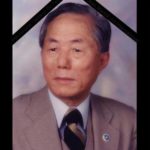
“clear, deep water / limpid water / the ancient name of a stream in Honan Province.” And Hi meant “aspect of fire ?? – bright.” And now “bright and brilliant / glorious / expansive / spacious / flourishing / prosperous / booming / peaceful and happy.”
Choi Jung Hwa 최정화 (崔情和)
![]()
![]()
![]()

Choi meant “the mountain ? only the bird ? can get to – high and steep” and morphed into “a Chinese family name / high and steep.” Jung meant “Foot coming to rest indicating complete.” And now “contaminated / straightforward and unbending / honest and virtuous / the person in charge / the person in command / the principal (as against the secondary) / to mete out punishment for a criminal / original (texts, etc.) / exactly / just / right / positively / main / principal / sharp / punctually / just / unbiased / a Chinese family name.”And Hwa was “people ? and ? in opposite directions – transform.” And now “to change / to convert / to transform / to influence / short for “chemistry.”
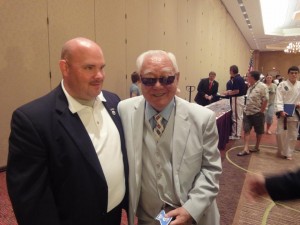
Nam Tae Hi 남태희 南太熙 ![]()

![]()
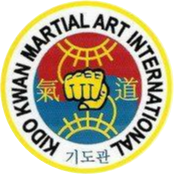
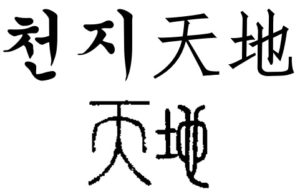
Average Rating